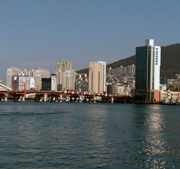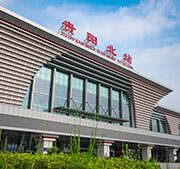Health, Water
 Economics
Economics
 Finance sector development, Urban development
Finance sector development, Urban development
 Finance sector development
Finance sector development
 Economics, Environment, Industry and trade
Economics, Environment, Industry and trade
 Governance and public sector management
Governance and public sector management
 Finance sector development, Poverty
Finance sector development, Poverty
 Video Blog
Video Blog
 Economics, Education, Finance sector development, Governance and public sector management
Economics, Education, Finance sector development, Governance and public sector management
 Economics, Finance sector development, Governance and public sector management
Economics, Finance sector development, Governance and public sector management

What can countries in Asia learn from the Republic of Korea and Malaysia about sanitation and its economic impacts?

In 2014, when I first moved to the Republic of Korea from India, I was impressed and awestruck by the country’s infrastructure and ease of mobility. Being an architect, the aspect I found most endearing of the city-wide master planning was the access and provision of toilets almost everywhere, be it at metro train stations, bus terminals, shopping plazas, parks, or even on mountain hikes. The convenience of having clean and hygienic toilets in public places was truly a gift for me during my stay there for a few years.
Opening-up in the upper middle-income stage: Implications from international experiences

After rapid economic growth lasting more than 30 years, the People’s Republic of China (PRC) has stepped into the upper middle-income stage. The country’s gross domestic product (GDP) per capita reached $6,416 (constant 2010 dollars) in 2015, equivalent to $13,400 in international dollars under purchasing power parity (constant 2011 international dollars).
New challenges, opportunities, and strategic choices for financing sustainable urbanization in the PRC

In recent years, the People’s Republic of China (PRC) has accelerated its urbanization process and increased its urbanization rate from 35.88% in 2000 to 56.7% in 2016, equating to over 1% year-on-year growth. The PRC proposed the “people-oriented” New-type Urbanization Plan in 2014 to definitively release further domestic demand potential, promote social equity and welfare improvements, and facilitate economic, social, and ecological integrated development.
Innovations in managing local government debt in the People’s Republic of China

The scale of local government debt (LGD) increased in most countries after the global financial crisis of 2008, resulting in accumulated potential fiscal risk and even systematic risk. Strengthening the management of LGD to avoid risk has become a hot topic. What is the current situation of LGD in the People’s Republic of China (PRC)? Is it high risk or not? What innovations are being implemented? Are there new challenges facing the Chinese government? What are the next steps? These issues, among others, have gained wide attention around the world.
International outsourcing, environmental costs, and welfare

In recent decades, amid the increasing trend of globalization, it has become prevalent in world trade that firms in some countries outsource intermediate and/or finished goods or services from other firms in foreign countries for the purpose of lowering production costs and increasing production efficiency.
Law, culture, and innovation

Many aspects of motivating innovation are painfully obvious, but much research on the topic is segmented depending on the particular issue of interest and the available data for examining that issue.
Remittances as a trigger for postal financial inclusion

More than 1 billion adult Asians rely on the region’s 350,000 post offices. Over 2 million employees in more than 350,000 post offices and agents across Asia serve 1 billion of the 3.2 billion adults in the region (more than 57% of the world’s adult population) by providing basic financial services, including the receipt of remittances. The majority of the users live in rural communities or peri-urban areas, often at a considerable distance from bank branches, and consider post offices as an immediate access point to financial services.
VIDEO BLOG: Empowering local communities to finance their clean energy future

The efficiency of solar power cells and lower cost of storage batteries means it has become possible for isolated villages and whole islands to generate their own electricity off-grid. Indeed, in the aftermath of two hurricanes that struck Puerto Rico, Elon Musk tweeted that independent solar power linked to batteries could rebuild that island’s entire electricity system.
Management quality and innovation

It is well recognized that innovation is an important ingredient in generating the competitive advantage and long-run growth of nations, ultimately affecting their economic development. Thus, there is considerable interest in the determinants of innovation, not only in the corporate sector but also among policy makers around the world and in Asia in particular.
Unconventional Monetary Policy in the Asian Financial Crisis

In a new paper, Unconventional Monetary Policy in the Asian Financial Crisis: Seeing the Crisis through Post-2008 Eyes, we reassess some of the policies central banks used during the Asian Financial Crisis of 1997–1998 in light of the responses of some advanced-economy central banks to the North Atlantic Financial Crisis of 2008. Public funding of bank recapitalizations in Thailand and the extraordinary purchase of equities in Hong Kong, China have elements of the unconventional monetary policy known as quantitative easing (QE) that has received so much attention in major advanced economies in recent years.


Search
Subscribe / Connect to Asia Pathways
Subjects
- Agriculture and natural resources
- Blog
- Capacity development
- Climate change
- Economics
- Education
- Energy
- Environment
- Finance sector development
- Gender
- Governance and public sector management
- Health
- Industry and trade
- Information and Communications Technology
- Infrastructure
- Miscellaneous
- Population
- Poverty
- Private sector development
- Regional cooperation and integration
- Sanitation
- Social development and protection
- Transport
- Uncategorized
- Urban development
- Video Blog
- Water
Recent Posts
- Artificial intelligence: A new driver for inclusive growth and development?
- Increasing trust in cross-border e-commerce and artificial intelligence
- Enhancing access to maternal and newborn healthcare in developing Asia
- Can electric vehicles lead the way to a sustainable future?
- Mitigating climate-related sovereign risk to accelerate action on the climate emergency




Recent Comments